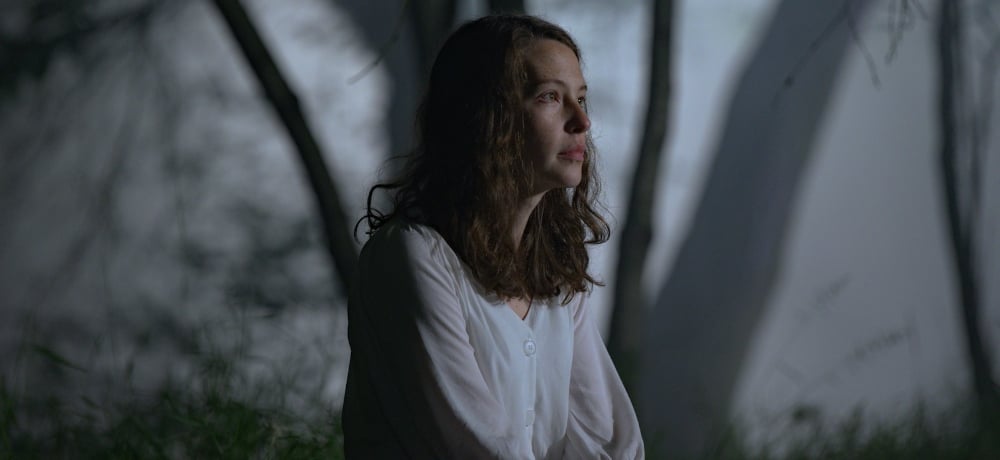


Whether films are set or filmed in Wales, the country and its ability to naturally bring eeriness to the screen thanks to its downcast weather have helped bring to life horror staples like The Old Dark House, The Wolf Man, and An American Werewolf in London. More often than not, you can find these titles on lists of the best horror films, and director Lee Haven Jones and writer Roger Williams throw their hat in the ring with a Welsh horror film of their own. The Feast is a parable of greed that acts as a warning of what could come if we don’t end the exploitation of the land. Themes centering on the environment and the climate crisis are ever-increasing in film, and it hits differently through the lens of horror, as it can more freely convey terrifying truths and present the consequences of actions in a violent, bloody way. While it fails its main character in terms of characterization, The Feast is an effective slow burn of intrigue and an engaging tale of supernatural revenge.
A score evoking that of a grand banquet about to commence greets the audience—or you could say, guests—to the Welsh countryside. Glenda (Nia Roberts) is the party organizer. She and her politician husband, Gwyn (Julian Lewis Jones), are inviting their business partner Eros (Rhodri Meilir) to wine and dine with their neighbor Mair (Lisa Palfrey) in an attempt to convince her to give them license to mine on her portion of the land. Manipulating Mair to get what they want by weaponizing her lack of wealth is rich coming from a family whose only wealth is monetary.
The modern production design of the home that plays host to this soirée lacks any warmth or privacy. The word “homey” is foreign here and the house feels empty even though it’s occupied. There’s a disconnect between all those who reside there. They all move to their different beats, especially the two sons, Gweirydd (Sion Alun Davies) and Guto (Steffan Cennydd). Guto represents the London punk subculture in his rebellion, and Gweirydd in contrast represents tradition with his pursuits as a doctor and obsession with fitness. A family built solely on wealth, they are both alien to the outside world and each other, resulting in a fragile dynamic. That fragility causes everything they represent to turn to ash after the arrival of another party.
Hired as a waitress for the night is Cadi (Annes Elwy). She’s expected to prepare the food and serve it to the family and their guests (but Glenda is seen doing most of the work). Cadi feels out of place and uncomfortable in this environment. You wonder why she’s even in this line of work, especially after Gwyn throws two dead rabbits on the counter and the thought of skinning them makes her sick. That moment is also the first time we hear her speak when she expresses disgust to Gweirydd. She spends the rest of the night walking around the place like a ghost. Her head seems elsewhere as she strokes curiously at a painting in the dining room or tries on Glenda's earrings with glee. However, her laughter isn’t of elation, but mockery. As she stands and observes the party with an unblinking gaze, you can’t help but think she’s scheming. Cadi gets to have her own feast, in more ways than one.
The cause of much of the aforementioned intrigue is the character of Cadi. When we first meet her, her hair is wet like she just walked out of the sea. And while she barely says a word, she begins to hum. This humming leaves a painful ringing in the ear, like the voice of a siren who’s able to bend men to her will and lead them to drown, and Cadi certainly leads this family down a doomed path. But while we learn quite a bit about the male characters in the film, especially Gwyn, the women are left with little. We are given hints that perhaps Glenda is feeling trapped in this swell of gluttony, but in the end is really only defined by the institution of marriage and motherhood. Cadi isn’t given any real backstory, either. It’s unfortunate because their performances and scenes together in the film are highlights.
The story also leans on a legend that’s never fully fleshed out. In a conversation between Glenda and Mair, you learn that a part of the land being mined is called the Rise. In the process of mining, they have awakened something dormant. This legend is of a woman who is “resting” in the Rise and being awakened could lead to the demise of all those who reside there. Who this woman is and how this legend came to be are never explained, but you could also interpret her to be Mother Nature, and our abuse of her land is unleashing the wrath we are experiencing more and more.
Gweirydd says his father loves to kill “innocent creatures,” and the rich certainly love to take what’s not theirs. While stumbling in places, The Feast effectively uses body horror to criticize this gluttonous group and allows our planet to air out its grievances as Mother Nature devours those who allow the devastation to continue.
Movie Score: 3.5/5
[Photo Credit: Above photo courtesy of IFC Midnight.]